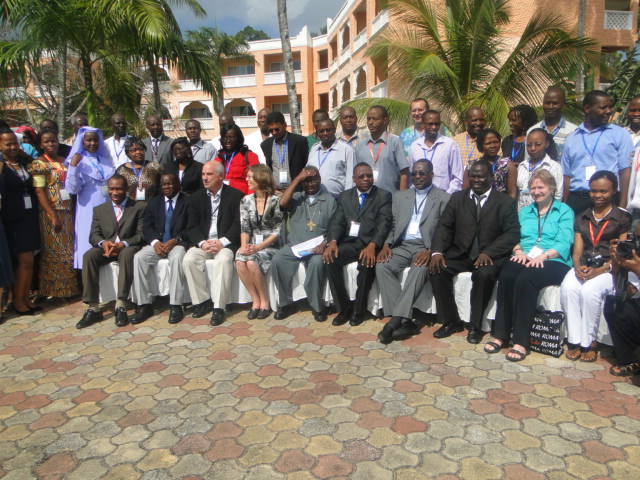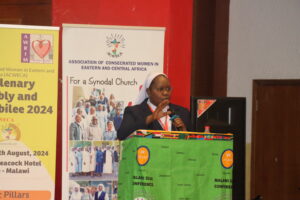KENYA: An Overview of UCAP Workshop on the Role of Media in Peace Building Conflict Resolution and Good Governance
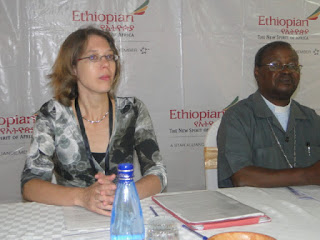
workshop in Mombasa Kenya from 23rd-26th July 2012. The workshop
whose theme was the role of media in peace building, conflict resolution and
good governance was well attended with representatives from all member
countries from Africa and collaborators from across the world.
 |
| Ms. Petra Stammen CAMECO Africa Desk and Most Rev. Boniface Lele of Mombasa listening to workshop presentations |
Among key
participants of the workshop included UCAP President Mr. Alexandre Le Grande
Rouamba from Burkina Faso, Ms. Petra Stammen of CAMECO, Africa Desk; Rev. Fr.
Janvier Yameogo from the Vatican’s Pontifical Council for Social
Communications; Mr. Anthony Spence the Director/Editor in Chief of the Catholic
News Service USA; Fr. Chrisantus Ndaga Executive Secretary of AMECEA Social
Communications and Most Rev. Boniface Lele Archbishop of the Catholic Archdiocese
of Mombasa who officially opened the workshop.
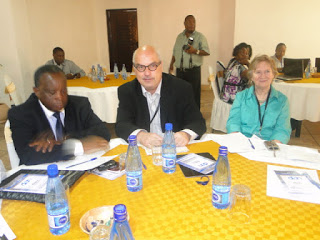 |
| From Left, Mr. Benedict Assorow, Director of Communications SECAM, Mr. Anthony Spence, Director/Editor in Chief CNS and Mrs. Else Strivens, Editor/publisher of Trefoil Magazine South Africa. |
Journalists which was created by UCIP-Union of the Catholic International Press
whose main objective was to provide platform for Catholic media practitioners
both from secular and church media to come together and propagate their faith
through their work.
Chapter and the Vice president of UCAP, UCIP had full mandate and support of
the Vatican under Pontifical Council of Social Communications in collaboration
with the Pontifical Council of the Laity. Unfortunately due to long running
internal strife and mismanagement, the Vatican denied it the use of the word
Catholic and withdrew its mandate from it. However, the regional branches of
UCIP of which UCAP is one of them continue to strive with the full support from
the Vatican.
its members; workshop and training conferences with a view of empowering the Catholic
media practitioners. Solidarity and networking are other major functions of
UCAP.
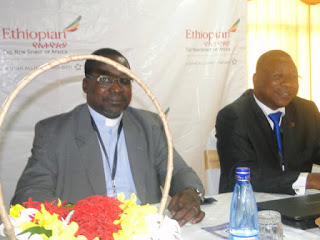 |
| Rev. Fr. Janvier Marie Gustave Yameogo, official from the Pontifical Council for Social Communication Vatican and Mr. Alexandre Rouamba, UCAP President |
The workshop in Mombasa is well attended by representatives
from the member countries which include Ghana, Ethiopia, Nigeria, Uganda, South
Africa, Tanzania, South Sudan, Zimbabwe, Kenya, Mali and Burkina Faso.
Stammen from CAMECO, Africa Desk Germany encouraged delegates to uphold the
spirit of network saying, “CAMECO would like to strongly encourage you in your
efforts towards networking, as we are strongly convinced that a strong Africa
network of Catholic communicators could be an excellent way to foster your
involvement in communication, but also to provide a better service to Africa
and from Africa to the rest of the world.” She added that networking is very
important as it allows for combine effort, which is greater than the sum of
separate initiatives.
and Editor in Chief of the Catholic News Services USA, talked about the following
proposals as possible courses of action for the Catholic media practitioners
that would help African Catholic Journalist do a better job in reporting about
the dynamic African societies.
is dialog. A newspaper editor understands that to be successful, he/she must
not simply talk to readers but rather must be in a conversation with their
audience. The same applies to all media products. An effective media is one in
which producers and consumers have a clear ongoing conversation. Mr. Spence
pointed out that there is no way for us to understand what media consumers want
or need unless we first listen to them and then design our media content in a
way that will have a positive impact on their lives as citizens and as
believers.
must continue to invest into each other due to the fact that both have rich
resources of culture and experience of which both parties can benefit. He
explained that while certainly the west have great economic wealth that can be
brought to the table, a better understanding on how mutual resources can come
together in a way that ensures effectiveness and sustainability must be
considered. These according to him includes successful formation programs where
Church leadership must identify the context of formation and training in Africa
for Africans-for faculty, for students and for practitioners with clear
outcomes that can be measured and the results seen in African communities.
network of trained Catholic Media professionals- certainly journalists who can
tell the story and experience of the African Church and people. Mr. Spence
explained that just like no single news organization can hope to cover all of
Africa completely, no single Catholic news organization can alone. He said that
it will take a coordinated network that is linked to the global Church.
BBC for nearly 20 years – Radio, TV, Magazine but now a Fellow with International
Center Fellow Journalists – a leading Pan African project to improve media coverage
of development issues in Africa through media training pointed out that the
media in Africa have lost control – of the message, the means of delivery and
the agenda.
that news about food, agriculture, and health for instance hardly features on
the front page of local daily yet media has a responsibility to society, to
ensure its well-being.
the agenda, the message and play our role in ensuring lasting peace and sustainable
development – as corporate citizens of Africa; journalists must adhere to the
following five steps which include; Investigating
issues by expose evil, highlight solutions and Celebrate champions of peace.
curiosity of your audience, readers and listeners and also by revisit stories:
i.e. what happened when cameras stop rolling. Step three is about packaging the stories by avoiding pigeon-holes,
develop stories according to time and seasons for instance when it is time for agricultural
activities, – just mainstream it – politics is never pigeon-holed.
way – adapt from big sellable themes politics, sports. And eventually step five is about telling the
stories in a compelling manner by use of gripping narratives, well
researched, well packaged and extremely well told.
be proactive and stop following politicians and giving them unnecessary
attention while much remain to be covered for the benefit of members of the
African society.
the organizers and it is their hope that what was discussed will go a long way
to improve journalism in Africa. Mr. George Sunguh, the Chairman of UCAP Kenyan
chapter who championed the organization of the workshop appreciated all who
collaborated to support in one way or the other, especially the financial
support. On behalf of UCAP, he thanked the Vatican’s Pontifical Council of
Social Communications, USCCB, SECAM, AMECEA Social Communications, CAMECO
Africa Desk, and Kenya Episcopal Conference among many others.
AMECEA Social Communications
